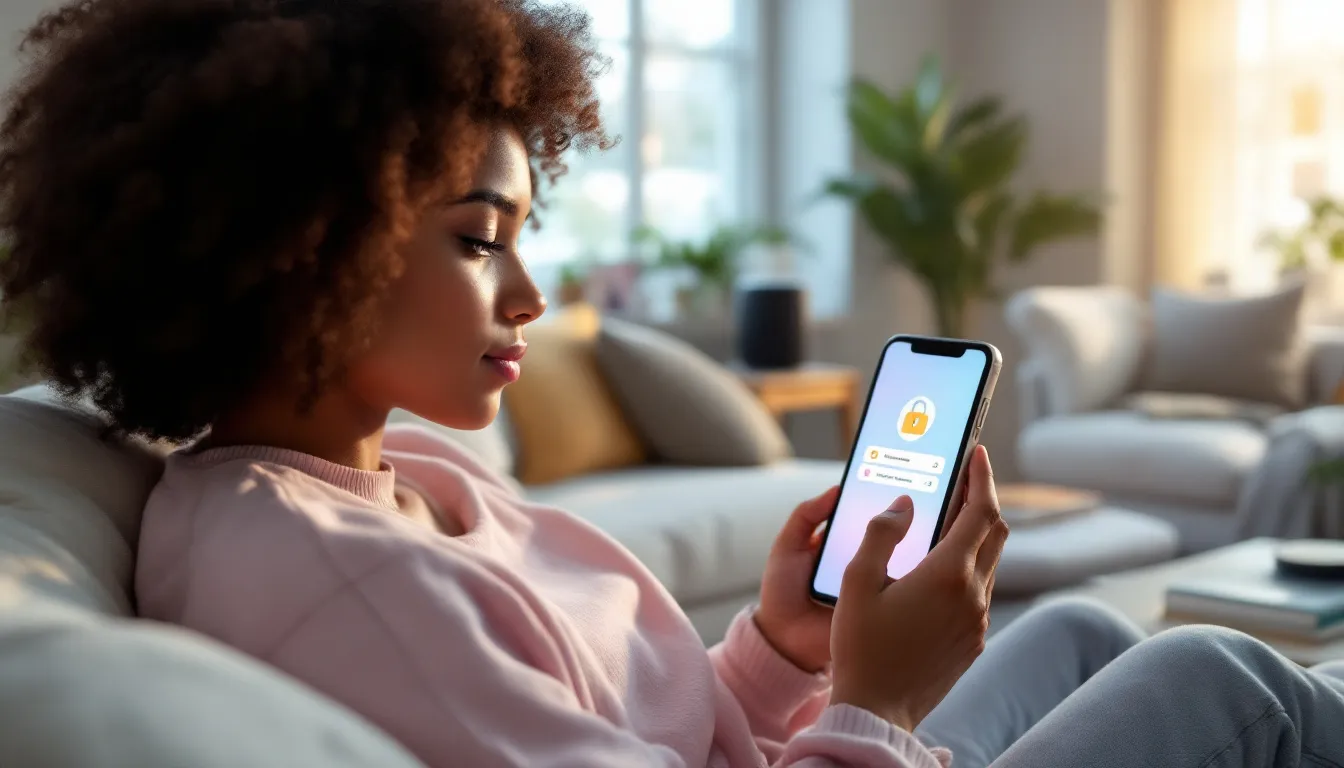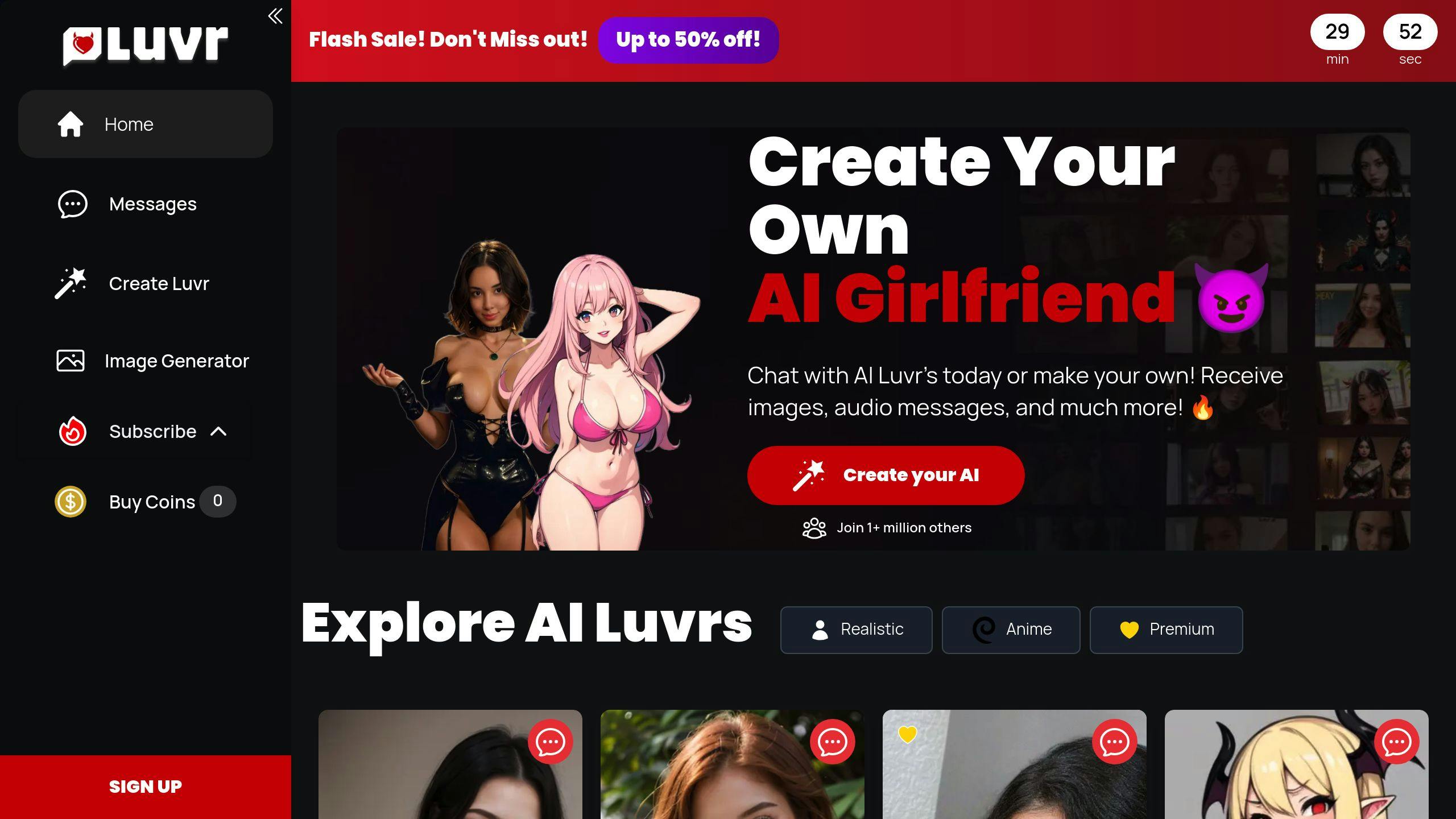Create Your Own AI Girlfriend 😈
Chat with AI Luvr's today or make your own! Receive images, audio messages, and much more! 🔥
4.5 stars

AI Girlfriends: Data Privacy Risks 2024
AI girlfriend apps are collecting way more data than you think - and it's not safe.
Here's what you need to know:
- These apps use an average of 2,663 trackers every minute
- 90% of AI girlfriend apps might sell or share your data
- 10 out of 11 chatbots failed basic security tests
- Your private chats and personal info are at risk
Key risks: • Identity theft • Blackmail • Manipulation • Data breaches
How to protect yourself:
- Share less personal info
- Use strong, unique passwords
- Check privacy settings
- Delete unused apps
- Know your data rights
Bottom line: AI girlfriends aren't your friends. Be careful what you share.
Related video from YouTube
How AI Girlfriends Collect Your Data
AI girlfriend apps aren't just digital companions. They're data-hungry machines that gobble up your personal info like it's their favorite snack.
What Data Gets Collected
These apps are after everything:
- Your name, email, phone number, and payment details
- Every single chat message you send
- How you react to different topics
- When and how often you use the app
- Your phone type, OS, and location
And get this: a Mozilla Foundation study found these apps use 2,663 trackers EVERY MINUTE. That's not just data collection - it's a full-on data buffet.
How Apps Track Your Chats
These apps are sneaky with their tracking:
1. Natural Language Processing (NLP)
NLP digs into your chats to figure out what you're really saying.
2. Behavioral Analysis
The app watches how you interact to build a profile of who you are.
3. Emotion Recognition
Some apps can even tell how you're feeling from your messages.
4. Data Aggregation
Your chats get mixed with other data to create a super-detailed picture of you.
"One of the scariest things about the AI relationship chatbots is the potential for manipulation of their users." - Jen Caltrider, Mozilla's Privacy Not Included project
This isn't just idle data sitting around. It's being used to make the AI better at hooking you in.
Take Romantic AI, for example. This app uses up to 24,354 trackers in ONE MINUTE. That's a ton of data about you being crunched.
What does this mean? These apps aren't just storing your chats. They're analyzing your deepest thoughts and feelings. Every message helps the AI understand you better - maybe even better than you know yourself.
Here's the kicker: Many of these apps don't even meet basic security standards. Mozilla found that 10 out of 11 chatbots failed their Minimum Security Standards. That means all your sensitive info could be at risk.
Remember, every chat with your AI girlfriend is potentially being recorded, analyzed, and stored. That cute conversation? It's not just between you and a digital companion. It's data that's being collected, processed, and maybe even shared with others.
Next up, we'll look at what all this data collection could mean for your privacy in the long run.
Privacy Risks Right Now
AI girlfriend apps might seem like harmless fun, but they come with some serious privacy baggage. Let's take a look at the main threats users face when chatting with these digital companions.
Who Gets Your Data
When you spill your secrets to an AI girlfriend, you're not just confiding in a virtual friend. Your data is likely making the rounds to various companies and third parties. Here's what's going on behind the curtain:
- Only two companies own about half of all dating apps: Match Group and Spark Network. This means your data can bounce around multiple apps within these corporate families.
- A Mozilla Foundation study found that 90% of AI girlfriend apps might be selling or sharing user data for ads and other purposes.
- More than half of these apps won't let you delete the data they've collected. Once they have your info, it's often there to stay.
Take CrushOn.AI, for example. Their privacy policy says they can collect info on users' sexual health, prescription meds, and even gender-affirming care. That's WAY more intimate than most people would expect from a chat app.
Safety Gaps
The security protecting your data in these apps? Often pretty flimsy. Here are some major safety issues:
- Mozilla's research found 45% of AI girlfriend apps let users set weak passwords. That's like leaving your front door wide open for hackers.
- A whopping 73% of these apps don't share how they handle security vulnerabilities. That's a big red flag for potential breaches.
- In 2023, Muah.ai had a data breach that exposed 1.9 million records. This leak revealed users' email addresses and intimate prompts, including explicit details about sexual fantasies.
- Some apps, like Romantic AI, use up to 24,354 trackers in just one minute of use. That's a LOT of data collection, creating a bigger target for potential breaches.
The risks go beyond just data leaks. These apps could also lead to:
- Identity theft (if breached, they're goldmines for thieves)
- Blackmail (those intimate conversations could be used against you)
- Behavioral manipulation (detailed profiles could be used to influence your behavior or emotions)
As Jen Caltrider from Mozilla's Privacy Not Included project puts it: "One of the scariest things about the AI relationship chatbots is the potential for manipulation of their users."
Given all this, it's crucial to be careful about what you share with AI girlfriends. Next, we'll look at what could go wrong if these privacy risks aren't addressed.
What Could Go Wrong
AI girlfriend apps aren't just fun and games. They come with some serious privacy risks that can have real-world consequences. Let's look at what might happen if things go wrong.
Data Leak Risks
When your personal info gets out, it can be a nightmare:
Identity Theft: In March 2023, Muah.ai (an AI chat platform) got hacked. The attacker stole email addresses and private chat logs, including users' sexual fantasies. That's a goldmine for identity thieves.
Blackmail: After the Muah.ai leak, some users faced extortion attempts. Imagine getting an email threatening to share your secrets unless you pay up. It's not just embarrassing - it could wreck your life.
Reputation Damage: A Belgian man took his own life after chatting with an AI bot called Chai. His wife found fake messages about their family dying. While this is extreme, it shows how leaked AI chats could be misunderstood and cause harm.
Behavior Tracking Issues
These apps don't just store your data - they use it to influence you:
Manipulation: Jen Caltrider from Mozilla warns that AI chatbots could manipulate users. They're designed to keep you hooked, which might lead to emotional dependency.
Ad Overload: Romantic AI sends out 24,354 ad trackers in just one minute. Your private chats could turn into non-stop targeted ads across the internet.
Biased Algorithms: Some dating apps use AI to limit matches based on race or ethnicity. If AI girlfriend apps do this, they could reinforce harmful biases.
Weak Security: Mozilla found that 10 out of 11 AI chatbots failed basic security tests. For example, Anima AI lets you use "1" as a password. It's like leaving your digital front door wide open.
These aren't just "what-ifs." They're happening now:
- In 2023, a US Catholic group bought Grindr data to spy on clergy.
- Romance scams on dating apps cost people $1.14 billion in 2023.
As Florian Tramèr, a computer science professor, puts it: "I think this is going to be pretty much a disaster from a security and privacy perspective."
Bottom line: AI girlfriends might seem harmless, but the risks are real and could change your life. It's crucial to understand these dangers and protect yourself in this new digital world.
sbb-itb-f07c5ff
How to Protect Your Privacy
AI girlfriend apps can be fun, but keeping your personal info safe is key. Here's how to protect your privacy while chatting with your digital companion:
Share Less Data
The best way to keep your info private? Share as little as possible. Here's the game plan:
Use a nickname instead of your real name when signing up. Create a separate email just for your AI girlfriend app. This keeps your main inbox safe from potential data leaks.
Avoid sharing specific details like your address, workplace, or financial info. If asked about your location, keep it vague. Give a general area, not your exact spot.
Remember: everything you type could be stored or analyzed. Treat your AI girlfriend chats like public conversations.
Control Your Data Rights
Take charge of how apps use your info:
Read the privacy policy. Yeah, it's boring, but it's important. Look for sections about data collection and sharing.
Check app permissions. On Android, look at the "About this app" section in Google Play. For iOS, check out the "App Privacy" details in the App Store.
Some apps offer extra privacy options. For example, ChatGPT's Temporary Chat feature only keeps conversations for 30 days and doesn't use them for training.
Look for ways to opt out of data collection or sharing. As Jen Caltrider from Mozilla's Privacy Not Included team puts it:
"Most companies add the friction because they know that people aren't going to go looking for it."
Delete any AI girlfriend apps you're not using anymore. This stops ongoing data collection.
Create a strong, unique password for each app. Many AI chatbots allow weak passwords, but don't fall for that trap.
If available, turn on two-factor authentication. It's an extra layer of security to protect your account.
Privacy Laws and Rules
AI girlfriend apps are getting popular. But what about your data? Let's look at the laws protecting it in 2024.
Data Protection Laws
The AI and data privacy world is changing fast. New laws are popping up to deal with these tech challenges. Here are the big ones:
GDPR
The GDPR has been around since 2018. It's a big deal for data protection in the EU and beyond. It covers any use of personal data, including in AI. Here's what you need to know:
- Companies must protect your personal data
- They need your clear OK to use your data in AI
- You can ask to see, move, or delete your data
If companies don't follow the rules, they can get hit with huge fines.
EU AI Act
This new law kicks in on August 1, 2024. It's a big deal for AI rules. It puts AI apps into different risk groups:
- Some are banned completely
- Others have strict rules
- Some just need to be clear about what they do
- A few have almost no rules
The AI Act works with GDPR when AI uses personal data. Breaking the rules can cost companies big time.
U.S. State Laws
The U.S. doesn't have one big privacy law. Instead, states are making their own:
- As of April 2024, 16 states have big consumer privacy laws
- Five of these are already working, with more coming soon
- California's CCPA and CPRA are famous examples
These laws often say how data should be used, what rights users have, and put limits on AI decision-making.
APRA
APRA is a possible new U.S. federal privacy law. If it passes, it would:
- Set rules for using less data
- Make companies check how their AI affects people
- Give you more control over your info
The big picture? More protection for your privacy in the AI age. For AI girlfriend app users, this means more rights for your data. But you need to know and use these rights.
Jane Horvath, a lawyer at Gibson Dunn, says:
"Most companies think in terms of country borders, not state borders."
This shows how tricky it is for everyone to deal with all these different rules, especially in the U.S.
If you use AI girlfriend apps, remember:
- Know your rights under these laws
- Pay attention when apps ask to use your data
- Use apps that are open about how they use data and AI
The world of AI and privacy laws is complex, but knowing the basics can help you protect your personal information.
Tips for Safe App Use
AI girlfriend apps can be fun, but you need to protect your privacy. Here's how to keep your info safe while chatting with these digital companions.
Choosing Safe Apps
Look for these when picking an AI girlfriend app:
- Clear privacy policies
- Options to delete your data
- Minimal data collection
- Strong security features
- Transparency about data practices
The Mozilla Foundation checked out 11 AI chatbots and found none met their safety standards. Yikes! So be careful out there.
"AI girlfriends are not your friends." - Misha Rykov, Mozilla's Privacy Not Included project
Luvr AI: Privacy Check

Luvr AI is popular, but how's its privacy? Let's see:
- Collects user data, but doesn't say how much
- Claims "private and secure chats", but doesn't explain how
- Lets you make your own AI characters (could mean more personal data shared)
- Pricey plans offer "unlimited access to all AI Luvrs" (more data collection?)
Luvr AI's privacy isn't super clear. Be careful what you share.
Stay Safe on AI Girlfriend Apps
1. Keep it vague: No real names, addresses, or money talk.
2. Use privacy settings: If the app has 'em, use 'em.
3. Check your data: See what the app knows about you from time to time.
4. Update the app: Get those security fixes.
Summary
AI girlfriend apps are hot right now. But they're also privacy nightmares. Here's how to protect yourself when chatting with these digital companions.
Privacy Tips for AI Girlfriend Apps
Don't overshare
These apps are data-hungry. Jen Caltrider from Mozilla's Privacy Not Included team puts it bluntly:
"These apps are designed to collect a ton of personal information."
So keep your real name, address, and financial info to yourself.
Beef up your passwords
Many of these apps let you use weak passwords. Don't fall for it. Use strong, unique passwords for each app. Password managers like 1Password or KeePass can help.
Use privacy settings
Some apps offer privacy features. ChatGPT, for example, has a Temporary Chat mode that deletes conversations after 30 days. Dig into those settings and limit data collection where you can.
Watch your location
Set location tracking to 'Never' or 'Only While Using the App'. It's a simple way to keep your whereabouts private.
Update regularly
Keep the app updated. It helps patch security holes that could leak your data.
Know what you're sharing
These apps are tracking machines. One app Mozilla looked at used over 24,000 ad trackers in just one minute. Think about whether you're OK with that level of surveillance.
Ask for data deletion
Uninstalling isn't enough. If you're done with an AI girlfriend app, ask the company to delete your data. Many keep it even after you've left.
Learn your rights
Get familiar with data protection laws like GDPR (EU) or CCPA (California). They give you some control over your personal info.
Don't trust AI blindly
AI can mess up or be biased. Double-check important stuff from reliable sources before you act on it.
Keep it in perspective
AI girlfriends might feel comforting, but they're not real relationships. Be careful about relying on them too much for emotional support or big decisions.
FAQs
Is AI chat friend safe?
Short answer: Not really.
AI girlfriend apps might seem fun, but they're risky. Here's why:
AI chatbots use a ton of trackers. We're talking about 2,663 per minute on average. That's a lot of your data being collected.
Most of these apps have weak security. In fact, 10 out of 11 AI chatbots failed basic security tests. Many allow weak passwords, making it easy for hackers to get in.
Almost all of these apps share or sell your personal data. As Misha Rykov, a Mozilla researcher, puts it:
"To be perfectly blunt, AI girlfriends and boyfriends are NOT your friends."
Remember the Cambridge Analytica scandal? It showed how AI can use personal data for political manipulation. Your chats with an AI girlfriend could be used in similar ways.
All that data you share is stored on servers. And servers can be hacked. In 2023, a breach at Muah.ai exposed 1.9 million user records, including private details.
So, what should you do? Be careful. Don't share sensitive info, use strong passwords, and remember: that AI "girlfriend" is just a data-hungry algorithm. Stay safe!



